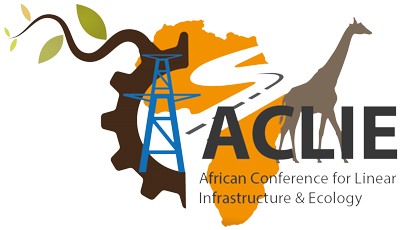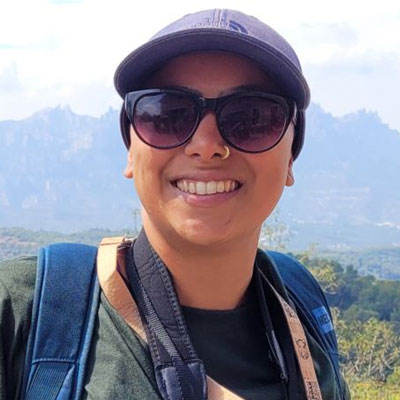ACLIE 2023
Workshops



ACLIE 2023 WORKSHOPS
Gathering data for roads 101
Collinson, WJ1
1The Endangered Wildlife Trust, South Africa
Despite evidence suggesting that road traffic is a major threat to biodiversity, very little is known about its impact on wildlife populations in Africa. Road density and traffic volumes are increasing globally, and although huge budgets are devoted to the construction and upgrading of roads, there is insufficient allocation to the implementation of mitigation measures for protecting fauna in most countries, particularly those in Africa.
As of 2019, the total population of Africa was estimated at 1.3 billion, representing 16.8% of the world’s population. According to UN estimates, the population of Africa may reach 2.49 billion by 2050 (about 26% of the world’s total), with an economic growth rate of 3.8% in 2022. To continue to enable this economic development, there are plans to “spur a major revolution” through investments in public transport, including road infrastructure, rail upgrades, freight services and intelligent transport systems, all of which will almost certainly impact wildlife.
To date, African road ecology studies have focused primarily on roadkill rates, with results highlighting the need not only for a greater understanding of the primary determinants of roadkill and its threat to biodiversity, but also the indirect effects of the country’s roads on wildlife. In 2013, we developed a standardised protocol for the detection of vertebrate roadkill, which has since been applied in several countries in the world.
Our presentation gives a brief overview of the current road ecology projects underway in Africa outlining (i) the development of road sensitivity maps for South Africa using the EWT citizen science roadkill database, (ii) identification of hotspots related to roads for both flora iii) monitoring animals killed on roads in protected areas in South Africa, (iv) implementing roadkill-reduction-measures in identified hotspots and assessing their effectiveness in reducing roadkill numbers, and (v) the use of social media as a tool to raise awareness of the threat of roads to biodiversity and a means to submit roadkill data.
Following this, we will then discuss roadkill data collection methodologies, and assist with designing data sheets.
We plan to continue to build capacity and find solutions to Africa’s roadkill issues. While Africa is fundamentally different to Europe and North America, application of the information and lessons learned in the Global North should be explored within the African framework. Major differences that may influence this process include faunal diversity, landscapes and geography, the density of roads and humans, socio-economic priorities, and funding and support for road ecology research and mitigation measures. The development of ‘African’ solutions may be required to solve uniquely African issues.
Wendy Collinson-Jonker is the Project Manager for the Endangered Wildlife Trust’s Wildlife and Transport Program where she is driving initiatives that address the now-recognised threat of linear infrastructure (namely, roads , runways and railways) in South Africa.
She sits on several international committees, the Global Congress for Linear Infrastructure and Environment (GCLIE), the Transportation Research Board (TRB; USA) and the IUCN’s Transport Working Group, the International Conference for Ecology and Transportation (USA), the European-based Infra Eco Network Europe (IENE) and Scientific Expert Committees (Europe), to provide support and showcase southern African linear ecology research.
She is also a consulting research member of the South African Roads Agency Limited (SANRAL).
Animal Detection and Driver Warning Systems
Manisha Bhardwaj1
Mattias Olsson2, Michele Deis3, Falko Brieger3
1University of Freiburg, Faculty of Environment and Natural Resources, Chair of Wildlife Ecology and Management, Freiburg, Germany
2EnviroPlanning AB, Gothenburg, Sweden
3Wildlife Institute, Forest Research Institute of Baden-Württemberg, Freiburg, Germany
University of Freiburg, Germany
University of Freiburg, Faculty of Environment and Natural Resources, Chair of Wildlife Ecology and Management, Freiburg, Germany.
Roads and other linear transport infrastructure can have detrimental impacts on wildlife, including mortality effects from wildlife-vehicle collisions, and barrier effects due to loss of landscape connectivity.
Wildlife crossing structures combined with suitable fencing are a commonly implemented mitigation strategy to reduce wildlife-vehicle collisions and increase landscape connectivity for wildlife. However, the effectiveness of fencing for traffic safety has an arguable effect on wildlife mortality since wildlife-vehicle collisions tend to occur more often on medium-sized roads, where fencing for wildlife is not prioritized, and wildlife crossing structures are seldom installed due to economical and constructional constraints. In such instances, at-grade fauna passages with roadside Animal Detection and Driver Warning Systems (ADDWS) may serve as an alternative to wildlife bridges and underpasses, since they are cheaper to install, simpler to construct and easier to maintain. ADDWS include systems to detect wildlife within a detection zone and warn drivers of the potential collision risk. In this workshop, we will discuss the design of ADDWS, and the landscapes in which they can be used effectively.
This workshop is for those with experience using detection and/or warning systems, and those without. We encourage all to attend and it would be great to get a mixture of experiences, including government officials, practitioners and managers, engineers, and researchers.
This workshop is hosted in part by the Infrastructure and Ecology Network Europe working group on Animal Detection and Driver Warning Systems
Manisha Bhardwaj is a wildlife ecologist, motivated to identify and mitigate the impacts of the built environment on wildlife.
She is currently a Postdoctoral Researcher at the University of Freiburg, Germany, where she is investigating human-wildlife interactions, and striving to create landscapes in which humans and wildlife can coexist.
She completed her PhD in 2018, at the University of Melbourne, Australia, where she evaluated the impacts of roads on insectivorous bats.

GCLIE 2023
Virtual Conference (links to be provided)
Thursday 14 September to Friday 15 September - Online Global Congress for Linear Infrastructure and Environment hosted by ACLIE
The 2nd Global Congress for Linear Infrastructure and the Environment (GCLIE) will take place online over two days between 14 – 15 September 2023. Under the main theme of PAVING A PATH FOR THE FUTURE, GCLIE is intended to compliment the current continental linear infrastructure conferences, through providing a platform that allows focus on broader, higher-level, global issues and policies that can influence national and international knowledge sharing and bring about positive change at the intersection between linear infrastructure and the environment. The inaugural Global Congress for Linear Infrastructure and the Environment (GCLIE) took place virtually on 20-21 September, 2021, and was hosted by the International Conference on Ecology and Transportation in 2021. With over 100 delegates from 24 different countries, the Congress aimed to provide a new opportunity for a global gathering that includes both the intellectual content of a scientific conference and the international reach of the United Nations and Sustainable Development Goals.
Send a Message
Professional Conference Organisers

IMAGINE. SHARE. LIVE
Connecting people through shared experiences.
africaMASSIVE is a turn-key Meetings, Incentives, Conferences, Events and Leisure Travel company that takes the stress out of your life, so that you can focus on living it!
Call Us
+27(0) 82 304 1538


